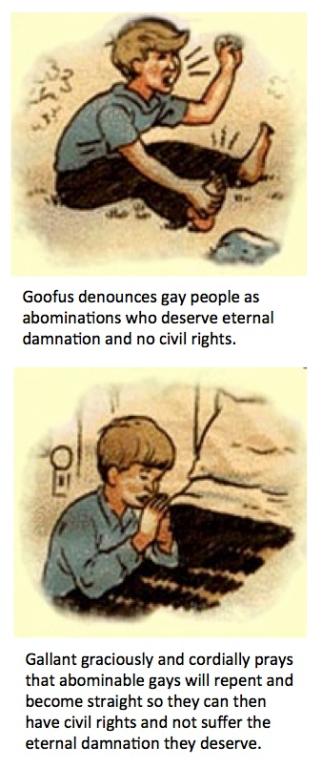Some white evangelicals are very upset over the recent kerfuffle involving the Rev. Louie Giglio.
Giglio has been a respected leader within the evangelical community, but his recent invitation to pray a benediction at President Obama’s second inauguration brought with it the national spotlight and the scrutiny of those outside the evangelical tribe. Giglio’s past sermons condemning homosexuality — and, more importantly, his implicit continuing endorsement of that condemnation — drew strong criticism, leading Giglio to withdraw his initial acceptance of the invitation.
The criticism directed at Giglio seems to have confused and angered many evangelicals who don’t see anything wrong, or even unusual, in the sermons about homosexuality for which Giglio was denounced. He is, after all, a nice guy, and his condemnations of what he calls the “homosexual lifestyle” were expressed in what he, and many of his fellow evangelicals, regard as a nice way.
Matthew Lee Anderson, writing for CNN, conveys the prevailing evangelical confusion over how Giglio’s niceness could be met with such a backlash:
Giglio’s sermon on homosexuality was in an entirely different league than Charles Worley’s, who momentarily became famous last year for ludicrously suggesting that gays and lesbians should be fenced off.
Indeed, Giglio’s defenders have been quick to point out that his position on the question comfortably fits the main currents of what Christianity has always taught about homosexuality, and does so with a gracious, cordial tone.
Anderson goes on to cite Southern Baptist leaders Al Mohler and Russell Moore expressing their offense that others are offended by Giglio’s comments. That doesn’t really tell us much about what’s going on, because Mohler and Moore are always offended by something or other — that’s their thing.
 But the same kind of reaction is being expressed by evangelicals less inclined toward perpetual offendedness and professional indignation. Andrew Marin and Michael Kimpan provide good summaries of the widespread confusion and offense in response to the criticism of Giglio, including folks like Gabe Lyons, Ed Stetzer and John Dickerson, who don’t tend to be Mohler-esque culture warriors.
But the same kind of reaction is being expressed by evangelicals less inclined toward perpetual offendedness and professional indignation. Andrew Marin and Michael Kimpan provide good summaries of the widespread confusion and offense in response to the criticism of Giglio, including folks like Gabe Lyons, Ed Stetzer and John Dickerson, who don’t tend to be Mohler-esque culture warriors.
I think the source of this confusion and anger is privileged distress, currently being expressed in the form of what I call “grievance envy.” I want to explore what that means — and to suggest how we might best respond to it — and we’ll get to that in the next post. But first I want to respond directly to Anderson’s suggestion, widely shared among evangelicals reacting to this latest controversy, that Giglio’s condemnation of LGBT people somehow involves a “gracious, cordial tone.”
There’s nothing gracious or cordial about it. That word “gracious” simply does not apply — not in the sentimental sense Anderson uses there, and not in the deeper, theological sense.
Anderson misapprehends two things there.
First is that what he and Giglio and others perceive to be a “gracious, cordial tone” does not seem at all gracious or cordial to those on the receiving end of it — not to people who understand the contemptuousness and vicious slanders invested in that phrase “homosexual lifestyle” or who understand the callous cruelty of the “ex-gay” ideology Giglio endorsed, which accuses LGBT people of having a moral, spiritual or psychological deficiency in need of a cure.
If you intend to be gracious and/or cordial, then you should never, ever, utter that insidious euphemism “homosexual lifestyle” ever again. Please. Thank you. OK, then.
The second thing that Anderson, Giglio, et. al., misunderstand about this “gracious, cordial tone” is that tone doesn’t matter. Substance matters.
Adopting a more gracious and cordial tone than Charles Worley sets the bar abysmally low, but it also is meaningless if that gracious and cordial tone is used to advocate the same denial of equality under the law and denial of equality under God that Worley advocates.
Or, as I put it back during Worley’s 15 minutes of infamy, “You can’t deny people their rights and be nice about it.”
Let me paraphrase part of that post to update it for our current context:
Anderson & Giglio want you to understand that they’re not at all like the infamous homophobic preacher Worley. They’re totally different.
Worley wants to deny LGBT people their basic civil rights and legal equality because he hates them. Anderson & Giglio want to deny LGBT people their basic civil rights and legal equality for other reasons.
See? See how very different they are? Same political agenda. Same desired outcome. Same fundamental discrimination enshrined in law. But Worley is mean. Anderson & Giglio are gracious and cordial. They’re nice.
And evangelicals like Anderson & Giglio have had it up to here with people not recognizing the extreme importance of that distinction. They share Worley’s hateful goals, but not his hateful sentiments, so how dare anyone compare them?












